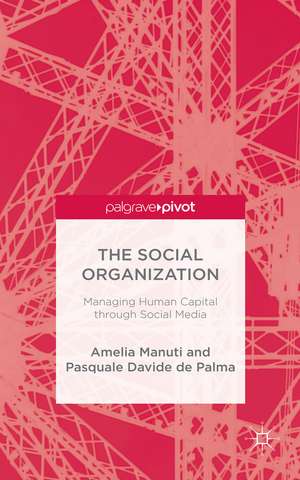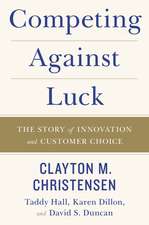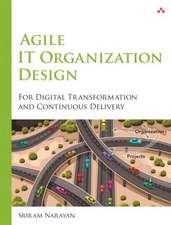The Social Organization: Managing Human Capital through Social Media
Autor Amelia Manuti, Pasquale Davide de Palmaen Limba Engleză Hardback – 15 dec 2015
Preț: 415.95 lei
Nou
Puncte Express: 624
Preț estimativ în valută:
79.59€ • 83.32$ • 65.86£
79.59€ • 83.32$ • 65.86£
Carte tipărită la comandă
Livrare economică 05-19 aprilie
Preluare comenzi: 021 569.72.76
Specificații
ISBN-13: 9781137585349
ISBN-10: 113758534X
Pagini: 112
Ilustrații: XVI, 93 p.
Dimensiuni: 140 x 216 x 10 mm
Greutate: 0.29 kg
Ediția:1st ed. 2015
Editura: Palgrave Macmillan UK
Colecția Palgrave Macmillan
Locul publicării:London, United Kingdom
ISBN-10: 113758534X
Pagini: 112
Ilustrații: XVI, 93 p.
Dimensiuni: 140 x 216 x 10 mm
Greutate: 0.29 kg
Ediția:1st ed. 2015
Editura: Palgrave Macmillan UK
Colecția Palgrave Macmillan
Locul publicării:London, United Kingdom
Cuprins
Introduction; John Burgoyne, Professor of Management Learning University of Lancaster
1. Human capital re-loaded: the use of social media in human resource management; Maria Cesaria Giordano, Amelia Manuti & Pasquale Davide de Palma
2. Communicating the "social" organization: Social media and organizational communication; Amelia Manuti
3. Enhancing human capital through social media: Promoting skills and learning through technology; Amelia Manuti, Maria Antonietta Impedovo & Pasquale Davide de Palma
4. Managing "Social" Human Resources: talent management in the "social" organization; Amelia Manuti
5. From theory to (good) practices. Human capital and social media according to human resource managers; Pasquale Davide de Palma & Amelia Manuti
Conclusion; Amelia Manuti & Pasquale Davide de Palma
1. Human capital re-loaded: the use of social media in human resource management; Maria Cesaria Giordano, Amelia Manuti & Pasquale Davide de Palma
2. Communicating the "social" organization: Social media and organizational communication; Amelia Manuti
3. Enhancing human capital through social media: Promoting skills and learning through technology; Amelia Manuti, Maria Antonietta Impedovo & Pasquale Davide de Palma
4. Managing "Social" Human Resources: talent management in the "social" organization; Amelia Manuti
5. From theory to (good) practices. Human capital and social media according to human resource managers; Pasquale Davide de Palma & Amelia Manuti
Conclusion; Amelia Manuti & Pasquale Davide de Palma
Notă biografică
Dr. Amelia Manuti is a senior researcher and Assistant Professor in Work and Organizational Psychology at the University of Bari, Italy. Her main research interests include the meaning of working in school-to-university and university-to-work transitions, vocational guidance, formal and informal learning, organizational identification, work values and organizational communication. She is author of several articles and publications on these topics. She is a member of the European Network of Work and Organizational Psychologists and of the International Association of Applied Psychology. She is also an active member of the Italian Association of Psychology and of Collaborative Knowledge Building Group. Since 2007 she has been secretary for the International Association of Applied Psycholinguistics.
Pasquale Davide de Palma is founder and CEO at Das HumanKapital which was placed sixth in the International Leadership Partner and Provider at Leadership 500 Awards 2015. Pasquale Davide is an expert in Industrial and Organizational Psychology, Social Recruiting and Social Human Capital. Pasquale's interests are focused on human capital management with particular emphasis on promoting the use of human capital financial statements within organizations. He is the editor of Why Human Capital is important for organization (Palgrave MacMillan, 2014) and The social organization: Managing human capital throught social media (Palgrave MacMillan, 2015).
Pasquale Davide de Palma is founder and CEO at Das HumanKapital which was placed sixth in the International Leadership Partner and Provider at Leadership 500 Awards 2015. Pasquale Davide is an expert in Industrial and Organizational Psychology, Social Recruiting and Social Human Capital. Pasquale's interests are focused on human capital management with particular emphasis on promoting the use of human capital financial statements within organizations. He is the editor of Why Human Capital is important for organization (Palgrave MacMillan, 2014) and The social organization: Managing human capital throught social media (Palgrave MacMillan, 2015).
Textul de pe ultima copertă
Social media is redefining how companies innovate by connecting people and ideas in previously unexplored ways.
Organizations now have the ability to utilize knowledge from external audiences around the globe that they could never reach before. It is changing the way organizations do business today, but not without some considerable risk. The Social Organization aims to shed a light on how social media usage is transforming the way organizations make sense of their identity and of their processes. By adopting a human capital perspective and merging the literature from communication studies and management research, the book argues that social media usage could be fruitfully exploited by organizations as a competitive advantage, if properly attuned with the official organizational culture and with a people-based approach to human resources.
Organizations now have the ability to utilize knowledge from external audiences around the globe that they could never reach before. It is changing the way organizations do business today, but not without some considerable risk. The Social Organization aims to shed a light on how social media usage is transforming the way organizations make sense of their identity and of their processes. By adopting a human capital perspective and merging the literature from communication studies and management research, the book argues that social media usage could be fruitfully exploited by organizations as a competitive advantage, if properly attuned with the official organizational culture and with a people-based approach to human resources.










